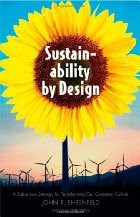
We've begun to have conversations with our tools. I've messed around with voice recognition software on my computers and tried out the different voices that can read onscreen text out loud. Many toys now speak to the kids sitting in the back seat of a car while the navigation system in the dashboard are speaking to their parents. These conversations assist us in doing what we're already doing. We remain under the spell of the tool which dictates our conduct and blinds us to alternatives.
In Sustainability by Design, John R. Ehrenfeld tells us that these conversations are not sustainable. We are unaware of what we are being, what role we've been enrolled to enact or what choices are available to us. He suggests that our technologies should interrupt what I have called our unconscious success routines. He uses the example of a two button toilet which offers the choice of flushing with less water. It saves water by making us aware of the sustainable or unsustainable role we're enacting.
As I played around with this way of seeing our conduct, I came up with several more extreme possibilities for disrupting our unsustainable behaviors:
- When we're about to put more petrol in our vehicle, the gasoline pump could question us: "where are you going that requires this fuel?", "what choices do you have other than making this trip?" or "how could this drive be combined with travel to other anticipated destinations?".
- When we're about to put groceries in our cart from the produce or packaged food aisles, the grocery cart could ask us: "have you considered the food miles and heat/cooling energy this item has already consumed and the carbon footprint that implies?", "are their other choices available which are more local and less energy intensive?" or "how can you revise your menu plans to eat in a more sustainable way?".
- When we've touched the thermostat to change the temperature setting in the space we're occupying, the thermostat could query our conduct with: "why are you changing my setting?", "how could you get more comfortable by a change in clothing instead f messing with me?" or "what changes in your schedule could reduce the heating/cooling load which counteracts outdoor temperature variations?".
These are design revisions to familiar technologies which increase sustainability. They go one better than reducing excess consumption. They change habits and perhaps even our culture of consumerism. They question how we are being and what we are enacting. However these disruptions to our unconscious consumption would be ferociously opposed by the enterprises profiting from our unquestioned expenditures.
These examples are also conversations that naturally occur when we experience symmetric relations with everything in our world. Actor-network theory envisions us relating to the interests of the networks we encounter through contact with grocery carts, fuel pumps, and thermostats. Networked interests in our increased consumption are conflicted by networked interests in our sustainability. When this debate is controlled by vested interests in our increased consumption, we feel silenced and poorly represented -- as Acting in an Uncertain World helps us discern. When this debate engages us in hybrid forums and dialogic democracies, we become transformed by our participation in the conversations. We define our choices and get defined by our choosing. We see the roles we're enacting and the ways to enroll others in our interests. We become sustainable, less by design, and more by showing increased interest in others' interests.
No comments:
Post a Comment